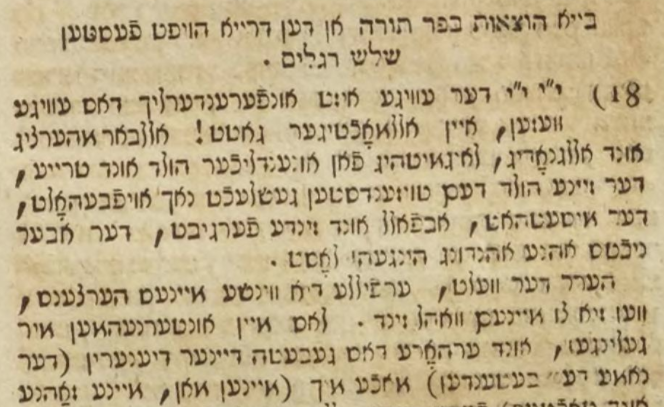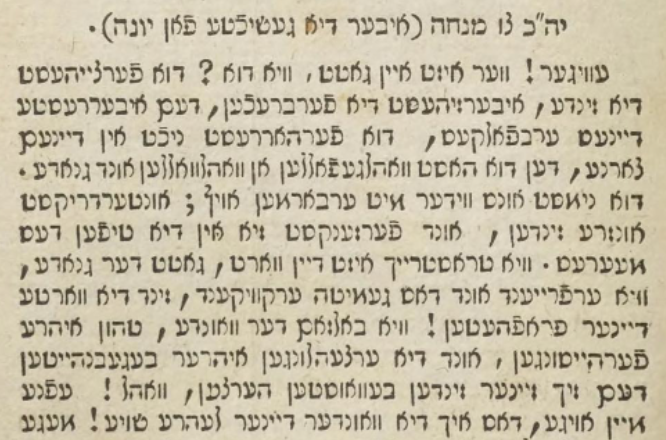| Source (German) | Translation (English) |
|---|---|
Die vier Erinnerungen. |
The four Remembrances.[1] Others indicate 6, 8, or 10 remembrances. Rabbi Yitsḥaq Luria (ARI z”l) indicates four remembrances in Pri Eitz Ḥayyim, Shaar Kriat Shema 3; Shaar Hakevanot, p. 119. The specific remembrance of the ARI not given here is that of the incident resulting from the speech and resulting punishment of Miriam (Deuteronomy 24:9). The memory of this incident is replaced here by the offering of Isaac by Abraham. While the offering of Isaac is not included in the customary lists of zikhronot, the recitation of the Aqedat Yitsḥaq is yet another supplement to the morning prayer service. |
Ewiger, der du uns die Kraft gegeben, unsere Blicke in die Vergangenheit zu werfen, und uns die Begebenheiten vergangener Zeiten zur Lehre, zur Warnung, oder Nachahmung vorzustellen, laß mir die Erinnerung lehrreich sein, an die Handlung unseres Stammvaters Abraham; der das große Beispiel gegeben hat, wie der gottergebene Mensch bereit sein müsse das Beste auf Erden zu opfern, im Vertrauen auf die Allweisheit und Güte seines Schöpfers. Laß uns stets bereit sein, dir o Vater! der du gewiß keine blutigen Opfer verlangst, täglich unsre Leidenschaften, Begierden und böse Neigungen zu opfern, um immer edler, und deiner würdiger zu werden. — |
Eternal One, who gave us the power to cast our eyes into the past, and to present to us the events of past times for teaching, for warning, or for imitation, let this memory be instructive to me, of the action of our forefather Abraham; who gave the great example of how the godly man must be ready to sacrifice what is best on earth, trusting in the all-wisdom and goodness of his Creator.[2] i.e., the Akedat Yitsḥaq (the sacrifice of Isaac), Genesis 22:1-19. Let us always be ready, O Father, who certainly does not demand bloody sacrifices,[3] Cf. Psalms 51:19. to daily sacrifice our passions, desires and evil inclinations in order to become ever more noble and worthy of you. — |
Laß mich den großen Tag nicht vergessen, an dem du deine Allmacht gezeigt hast vor der Erde, und durch deine Wunder die Völker der Erde nöthigtest zu erkennen, daß du allein Gott seyst, durch die Wunder, die du in Egypten verrichtet hast. Wir, dein erwähltes Volk lernen noch heute aus jener Begebenheit, daß du Allgütiger, treu bist in deiner Verheißung, und dich stets annimmst der Unterdrückten mit deiner Gerechtigkeit, vor der keine Macht bestehen kann. |
Let me not forget the great day when you showed your omnipotence before the earth, and by your miracles made the peoples of the earth recognize that you alone are God, through the miracles you performed in Egypt. We, your chosen people, still learn from that event that you, the All-good one, are faithful in your promise and always take care of the oppressed with your justice, before which no power can stand. |
Gedenke, heißt es in der heiligen Schrift, gedenke des Tages, an welchem du gestanden hast vor dem Ewigen, deinem Gotte, am Berge Horeb![4] Sinai. Im Jahre der Welt 2448. Und was wäre der Erinnerung würdiger, als diese große und heilige Weltbegebenheit, wo du Allmächtiger dich herabgelassen hast, ein Volk deine Stimme hören zu lassen, und ihnen zu sagen: „Ich bin der Ewige, dein Gott, du sollst keine andern Götter haben neben mir!” Behüte mich, o Gott, daß ich nie so tief sinke, mir einen Gott zu machen von Silber und Gold, das heißt, mich den Freuden der Erde hinzugeben, und auf etwas, was Menschen verehren, als: Schönheit, Ehre, Reichthum, mehr mein Vertrauen zu setzen, als auf dich, Allgütiger Gott! |
Remember, it says in the holy scripture, remember the day on which you stood before the Eternal, your God, at Mount Horeb![5] Sinai. In the year of the world 2448. (Deuteronomy 4:9-10) And what would be more worthy of remembrance than this great and holy world event, where you Almighty condescended to make a people hear your voice, and to say to them, “I am the Eternal your God, you shall have no other gods beside me!” (Exodus 20:3) Protect me, O God, that I never sink so low as to make for myself a god of silver and gold, that is, to give myself up to the pleasures of the earth, and to place my trust in something that men worship as: Beauty, honor, wealth, to put my trust more than in you, All-good God! |
Laß mich der Liebe nie vergessen, des Wohlwollens, das ich allen meinen Geschöpfen als Werke deiner Hand, als Kinder eines gemeinschaftlichen Vaters, schuldig bin. Möge sich mein Gemüth nie so weit verirren, einen Unschuldigen zu unterdrücken. Das göttliche Mißfallen an die schändliche Verfolgung des Amalek wider das Volk Israel, bei ihrem Ausgange aus Egypten, sei mir stets gegenwärtig (2 B. M. 17, 8). |
Let me never forget the love, the goodwill, which I owe to all my creatures as works of your hand, as children of a common father. May my mind never stray so far as to oppress an innocent. May the divine displeasure at Amaleq for their shameful persecution against the people of Israel, upon their departure from Egypt, always be present to me (Exodus 17:8). |
Oeffne mein Auge, Herr, und laß mich die Wunder deiner Lehre schauen. Amen. |
Open my eye, Lord, and let me see the wonders of your teaching. Amen. |
“Die vier Erinnerungen” was translated/adapted by Yehoshua Heshil Miro and published in his anthology of teḥinot, בית יעקב (Beit Yaaqov) Allgemeines Gebetbuch für gebildete Frauen mosaischer Religion. It first appears in the 1829 edition, תחנות Teḥinot ein Gebetbuch für gebildete Frauenzimmer mosaischer Religion as teḥinah №21 on pp. 24-25. In the 1835 edition, it appears as teḥinah №21 on pp. 28-30. In the 1842 edition, it appears as teḥinah №23 on pp. 31-33.
We welcome corrections and improvements. The transcription of the German from Latin script in Fraktur type provided machine-readable text for a machine translation by DeepL, which we then edited for accuracy and clarity. –Aharon Varady
Source(s)


Notes
| 1 | Others indicate 6, 8, or 10 remembrances. Rabbi Yitsḥaq Luria (ARI z”l) indicates four remembrances in Pri Eitz Ḥayyim, Shaar Kriat Shema 3; Shaar Hakevanot, p. 119. The specific remembrance of the ARI not given here is that of the incident resulting from the speech and resulting punishment of Miriam (Deuteronomy 24:9). The memory of this incident is replaced here by the offering of Isaac by Abraham. While the offering of Isaac is not included in the customary lists of zikhronot, the recitation of the Aqedat Yitsḥaq is yet another supplement to the morning prayer service. |
|---|---|
| 2 | i.e., the Akedat Yitsḥaq (the sacrifice of Isaac), Genesis 22:1-19. |
| 3 | Cf. Psalms 51:19. |
| 4 | Sinai. Im Jahre der Welt 2448. |
| 5 | Sinai. In the year of the world 2448. |

“Die vier Erinnerungen (ארבע זכירות) | The Four Remembrances, a teḥinah by Yehoshua Heshil Miro (1829)” is shared through the Open Siddur Project with a Creative Commons Attribution-ShareAlike 4.0 International copyleft license.










Leave a Reply